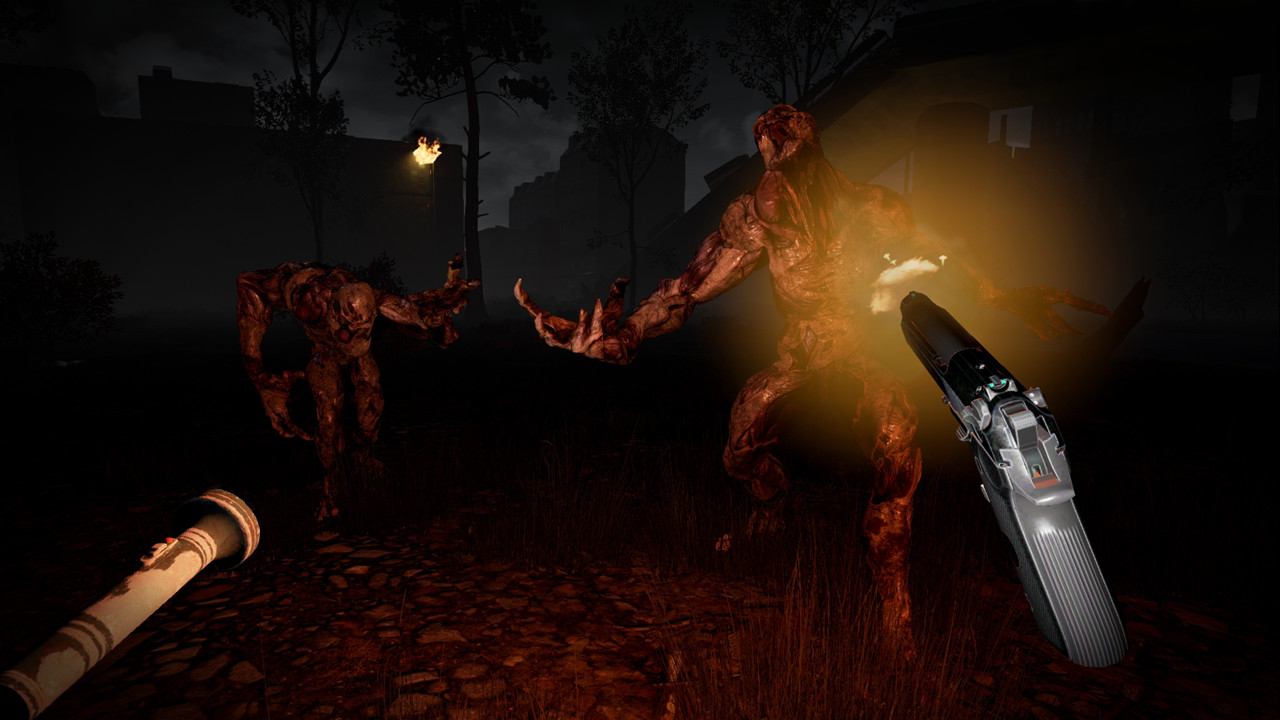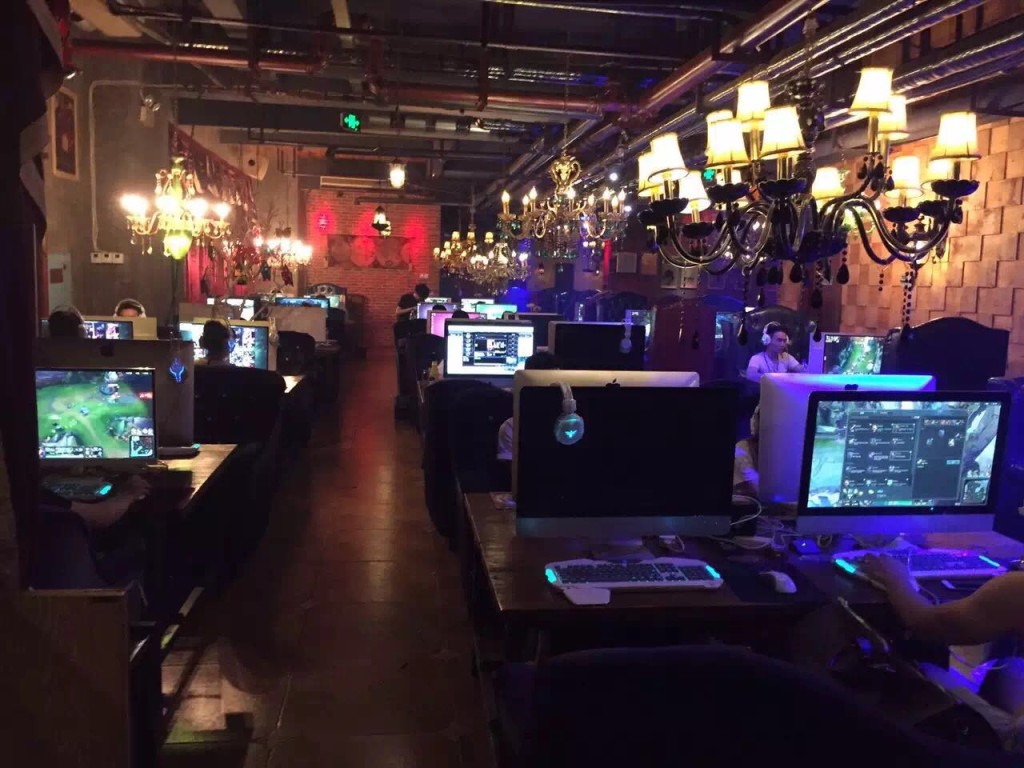The Brookhaven Experiment, a survival horror game releasing on June 22 for the HTC Vive, challenges players to survive against waves of terrifying monsters. Although the virtual reality game has yet to release officially, its demo has already made a huge impact on gamers, and it will soon achieve international renown, as Phosphor Games announced today that it is the first U.S. company to sign a direct distribution deal with the Chinese company Shunwang.
While video game arcades are hard to find in the U.S. and most other Western countries, they’re a thriving business in China, as demonstrated by the huge number of iCafés where customers can come in to play computer games. Shunwang operates over 100,000 locations, which comes out to more than 70 percent of the iCafés in China, reaching over 110 million gamers each year. Now the company is working to upgrade all of them with VR Zones featuring The Brookhaven Experiment as a premier experience.
At a time when one of virtual reality’s biggest challenges is getting the technology in the hands a wide audience, VR arcades may prove to be the biggest point of entry for many consumers. It might not be long before we see more VR arcades, similar to the VR Zones found in Shunwang’s iCafés, to start showing up in the U.S.
Justin Corcoran, CEO of Phosphor Games, speaks to [a]listdaily about how The Brookhaven Experiment is spreading across China, and is poised to become one of the most well-known titles in VR history.
How did the partnership to have The Brookhaven Experiment featured in Shunwang VR Zone arcades come about?
When HTC and Shunwang announced their partnership back in December of 2015, we were already working on Brookhaven, and quite consciously designing it for multiple markets and play styles. Once we learned that HTC had trusted Shunwang to be their key partner for Mainland China, and that they served 100,000 internet cafes with their game platform, we decided then and there to approach them about Brookhaven once we announced it, as it was designed to play well in an internet café setting. We were pleasantly surprised to have Shunwang beat us to it as soon as the Brookhaven demo was released on Steam. They played it, loved it, and wanted it for their VR Zones, so they reached out to us. We met at GDC, had very aligned visions about the future of VR, and put our plans in place to have The Brookhaven Experiment be one of the first games Shunwang is using to debut VR Zones all over China.
How does The Brookhaven Experiment translate into an arcade experience? Will it be the full game, demo, or a special arcade version?
Brookhaven translates very well into an arcade experience, and in fact, that was one of the intended play experiences from the beginning of development. Shunwang is already getting a great response and seeing lines queue up just from the demo.
All the versions of the game will have two modes: a campaign mode, where you are progressing through waves of monsters in a series of locations that follow the story of The Brookhaven Experiment gone terribly wrong, and an endlessly escalating challenge mode that will get harder and harder so you can compete to see how long you survive. Shunwang expressed that their audience would like both modes. The big difference in the Chinese iCafés mode is that it will have IAP (in-app purchases), which is a common and welcome practice in that market.
What makes The Brookhaven Experiment the ideal game to have in a VR Arcade?
Brookhaven is a great VR experience in general because you feel truly present in the game—the environment and situation feel so real around you, and pretty darn scary and thrilling without going overboard. Once you get the hang of it and start getting head shots and beating waves of monsters, you go from feeling helpless to feeling like a badass, and just want to keep playing to see how good you will get. It’s an immersive shooting experience like nothing you’ve ever had before as a gamer.
What works especially well for the arcade setting is that it comes in waves, giving you a break in between the moments of adrenaline and terror, and giving you a chance to see how well you did verses your last playthrough, or against your friends’ playthroughs, so you can try to beat it.
Also, based on over 10 million views worth of YouTubers over the past month, it’s pretty fun to watch people play and freak out!

Do you think VR arcades have a chance to take off in the US or other Western countries?
Based on how many different VR arcade startups from all over the world are reaching out to us, we think that it has about as good a chance as it ever will. There is a window right now when a lot of people are hearing about and are curious about VR, but may not want or are unable to make the investment to buy a setup.
Eventually, the cost of entry will come down, and VR will come into more homes. But until then, VR arcades can be a way to experience the next great revolution in virtual interaction and learn what all the excitement is about—because VR really is as awesome as people are saying, when it’s done right. As PewDiePie put it when playing Brookhaven, “That was intense, I feel like a badass. VR is here, and it’s fucking beautiful!”
What role do you think VR arcades will play in encouraging adoption of home VR?
We feel that VR arcades can be for the global VR market what the iCafés over the past 20 years have been for the Chinese PC gaming market: a low-cost-of-entry exposure to a fantastic experience that paves the way to widespread adoption. Eventually VR experiences like The Brookhaven Experiment won’t need an expensive headset and an even more expensive computer, or high-end console, to run it. But until then, it’s a significant investment to bring the best of VR home, so going to a VR arcade gives you that experience for a few dollars at a time, just like the old days of arcades.
How does it feel to know that The Brookhaven Experiment may be played by thousands of people across China?
It feels fantastic! It has been a plan of ours for as long as we have been both working on VR, and watching what was happening with the Chinese gaming market, to bring our games there in a major way. But, to be honest, our goal is not to have thousands of people playing it in China—it’s to have millions. Shunwang serves 100,000+ internet cafés (70 percent of the market), and has over 100 million users on their platform. They are already well ahead of anyone else in the world (that we’ve heard of) by having VR Zones in 50 iCafés in major cities in China, with plans to get the rest of the 100,000 iCafés setup with VR over a few short years. That means that Brookhaven will continue to be a novel experience for thousands of new players every month, as more and more VR Zones come online, for years to come. We could not be more excited!
Will you be keeping the arcade experience in mind should you decide to develop another VR game?
We most definitely will. We already do, in fact, have other VR games in active development, and even more in planning—and they are all being designed with multiple markets and play styles in mind. We don’t see the audience for our VR titles as a single group that all want the same thing. That is not the reality of the modern global gaming landscape, and it definitely won’t be the reality as that audience immerses itself in VR.
As we move aggressively into VR as a studio, we are looking at every title and thinking, “What will the Western audience want in their version? What will the Asian market want? What will work best for the Chinese iCafés and VR Arcades? How will this translate to mobile VR? How could this work on a casino floor? How will this work best in room scale vs. stationary 360 degrees vs. 180-degree front-facing setups?”
A well-designed VR game can be customized in different ways while still maintaining its heart, if you go in from the beginning of the design process with that in mind. Our original mobile games like Horn, The Dark Meadow and The Path to Luma were played to critical acclaim the world over, and we plan to repeat that in VR.

